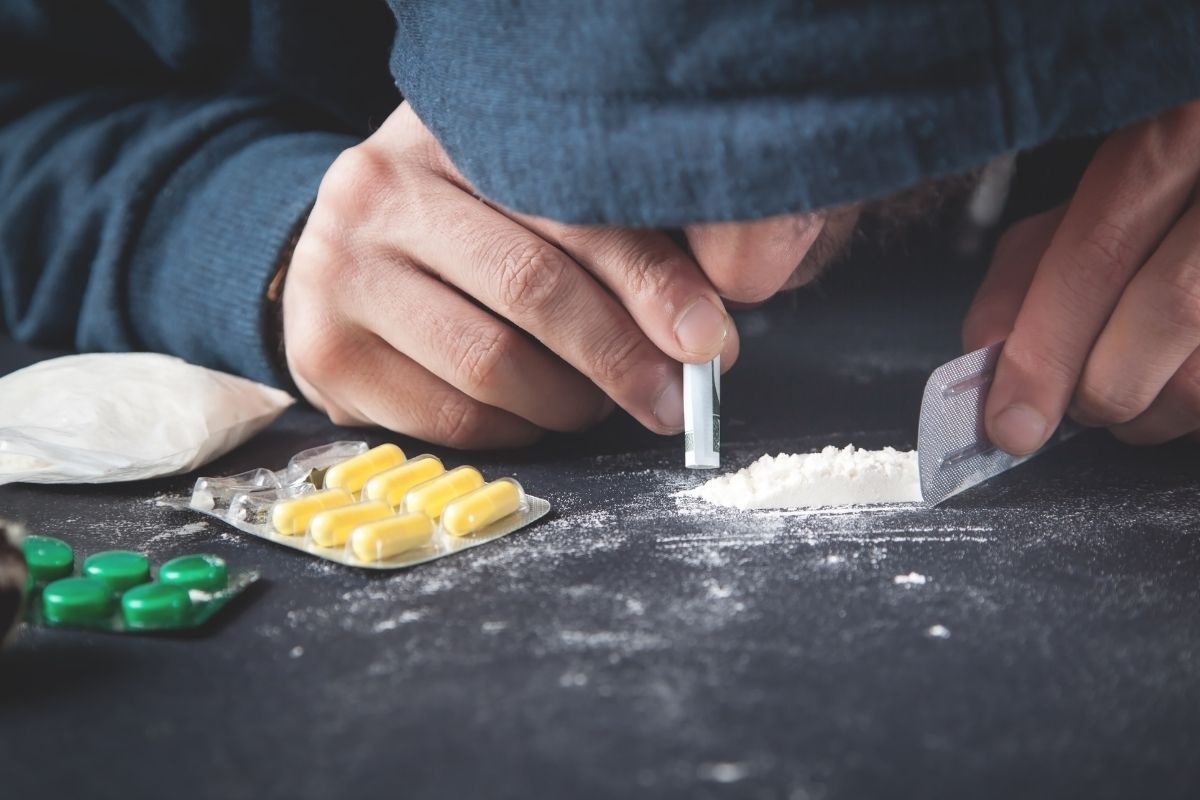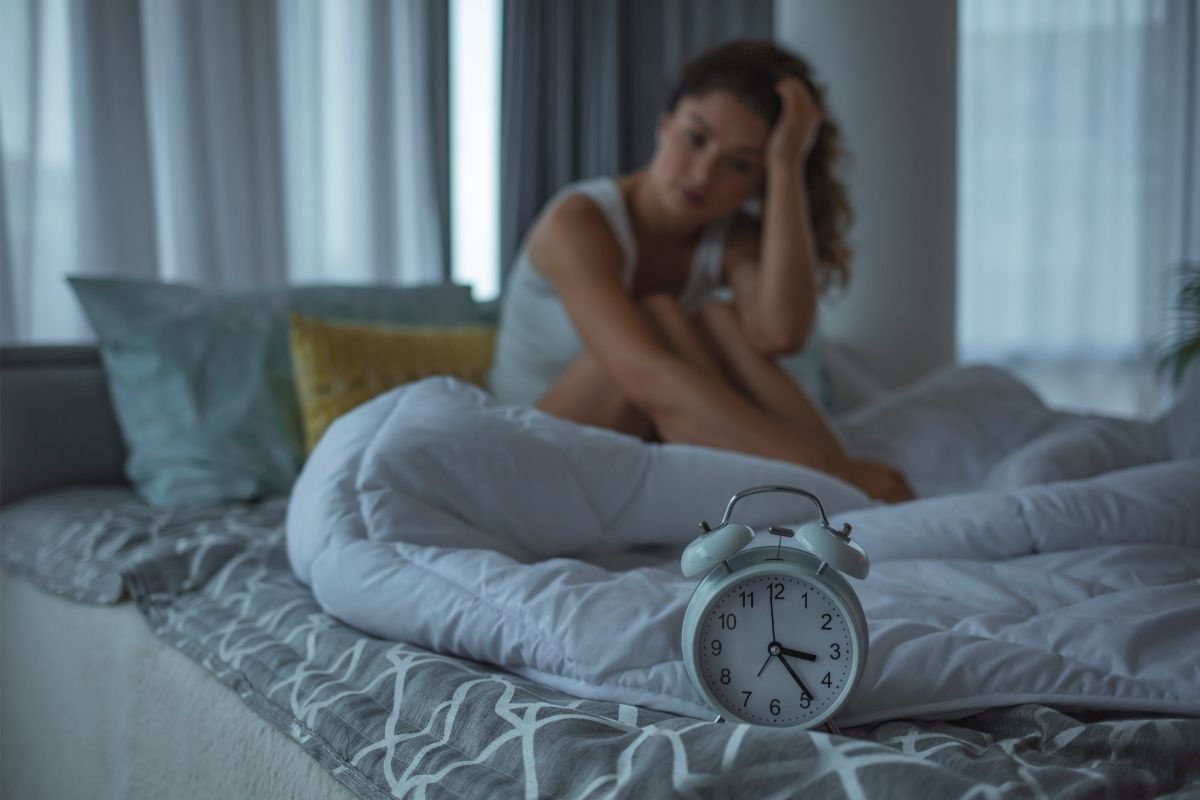Insomnia is a common problem affecting millions of Americans every year. Many people suffer from chronic sleep problems that affect their quality of life.
While some people experience insomnia due to stress or other health issues, others develop insomnia caused by substance abuse.

Are you struggling with insomnia as well as alcohol or drug abuse? And can it be your addiction that is contributing to insomnia?
Alcohol and drugs can affect your sleep patterns in several ways. They can disrupt your normal sleeping cycle, interfere with your body clock, and even impair your ability to fall asleep.
If you’re suffering from insomnia, you may want to consider cutting back on your drinking or using substances altogether. It could be time to get some help.
Many people who struggle with alcoholism also suffer from insomnia. This is because alcohol affects your brain chemistry, causing changes in neurotransmitters such as serotonin and dopamine.
These chemicals play a role in regulating our sleep cycles. We look at all these reasons in closer detail, to work out why addiction could cause insomnia and how to recognize the signs. Let’s jump in.
What Is Insomnia?
Insomnia is defined as difficulty falling asleep or staying asleep for more than three nights per week.
The National Institute of Health defines insomnia as “difficulty initiating or maintaining sleep”. In other words, someone with insomnia has trouble falling asleep or staying asleep throughout the night.
People often wake up feeling tired during the day, which makes them feel like they need more rest, yet when the opportunity arises to get some rest, finding sleep seems impossible.
In addition to being physically exhausted, those with insomnia have trouble concentrating and remembering things.
Some people suffering from insomnia report having nightmares when they finally do get some sleep, and others have vivid dreams that make them uncomfortable when they awaken.
People with insomnia are likely to snore loudly, have dry mouths, and sweat excessively. They might also have an irregular heartbeat, chest pain, and shortness of breath.
Causes Of Insomnia
There are many different causes of insomnia. Here we’ll take a look at the most common ones.
Stress
Stress is one of the leading causes of insomnia. When you’re stressed, your body releases adrenaline into your bloodstream.
Adrenaline stimulates the release of cortisol, a hormone that helps regulate blood sugar levels. Cortisol can keep you awake and prevent you from getting a good night’s sleep.
Sleep Apnea
Sleep apnea occurs when your airway closes off, either partially or completely, while you sleep. This prevents oxygen from reaching your lungs, so you stop breathing properly.
As long as this happens, you won’t be able to enter REM (rapid eye movement) sleep. You will instead remain in light sleep, where your brain doesn’t function properly, or, of course, wake up a number of times throughout the night.
Medications
Certain medications can cause insomnia. For example, antidepressants, antihistamines, muscle relaxants, and sedatives can alter your sleep pattern.
Other medications can trigger anxiety and panic attacks, making it difficult to fall asleep.
Medical Conditions
Several medical conditions can cause insomnia. These include thyroid disorders, diabetes, heart disease, high blood pressure, depression, and arthritis.
Other causes include a poor travel or work schedule, eating too late in the evening, bad sleeping habits, mental health disorders, and of course, addiction, which we will look at in the next section.
Can Addiction Cause Insomnia?

Addiction can cause insomnia in many different ways. When you’re addicted to alcohol or drugs, you’ll find yourself constantly thinking about getting high.
Your mind will keep racing, and you won’t be able to relax. You may have thoughts about craving or planning to use alcohol or drugs.
When you’re under the influence of alcohol or drugs, you’re less likely to notice if you’ve had enough sleep.
As a result, you may not know when it’s time to go to bed, and you’ll stay up later than usual, which can throw off your sleep cycle.
If you’re abusing alcohol or drugs, you may have trouble falling asleep at night. Alcohol and drugs slow down your breathing, so you may find it difficult to breathe deeply.
This causes your heart rate to increase, which keeps you awake.
Your body clock may also be affected by alcohol or drugs. Drugs and alcohol alter the levels of hormones in your body.
These hormones regulate your circadian rhythm or internal biological clock. This means that your body clock gets confused, and you don’t experience normal sleep-wake cycles.
Alcohol and drugs can also affect your ability to fall asleep and stay asleep. You may find it hard to concentrate on relaxing before going to bed since you’re too busy thinking about or experiencing the effects of drugs and alcohol.
You may also have problems with anxiety and depression associated with addiction. These conditions can cause insomnia.
For example, if you’re anxious or depressed, you may find it difficult to fall asleep as you have so much on your mind, even though you want to get some rest.
Why Does Alcohol Affect Sleep?
Let’s take a look at how alcohol can affect your sleep in closer detail:
- Alcohol interferes with the production of melatonin, a hormone produced by the pineal gland in your brain. Melatonin helps regulate your circadian rhythm (the biological process that controls your sleep-wake cycle). When you drink alcohol, your body produces less melatonin, so you don’t naturally produce enough to function.
- Alcohol impairs your ability to stay focused. Your mind becomes foggy after consuming alcohol, making it harder to think clearly. You’ll find yourself thinking about random thoughts instead of focusing on getting some rest.
- Alcohol increases your heart rate and blood pressure. As a result, your breathing gets faster. This stimulates your nervous system, which keeps you alert.
- Alcohol reduces the amount of oxygen available to your brain. Because you’re not getting enough oxygen, your brain doesn’t function properly. This means you won’t be able to relax and go to sleep.
- Alcohol suppresses the release of certain hormones, including adrenaline, cortisol, and prolactin. These hormones help your body prepare for stress, but they also promote feelings of relaxation and calm. If you consume alcohol before bedtime, you may not experience these calming effects.
- Drinking alcohol affects your body’s natural sleep cycles. It takes approximately 90 minutes for your body to fall into a deep state of sleep. After one hour, your body begins to slow down its metabolism. At two hours, your muscles begin to relax, and at 3 hours, you’re in a serene state. By 4 hours, you should be fast asleep, but this doesn’t always happen with alcohol.
What About Drugs?
Drugs can affect our sleep in several ways such as:
- They suppress the release of certain hormones that are important for regulating sleep. Moreover, certain drugs, like Valium, Xanax, and Ambien, are designed to treat insomnia. But when taken regularly, these drugs can make you more tired.
- Some drugs, like cocaine, amphetamines, and heroin, can increase your heart rate and blood flow. This causes increased levels of dopamine, a neurotransmitter responsible for keeping us awake.
- Other drugs, like marijuana, can reduce the activity of certain parts of the brain, causing drowsiness, yet this popular drug can exacerbate sleep issues and may well even be the cause of someone’s insomnia.
- Even if you don’t have any drug or alcohol problems, some prescription medications can cause insomnia. For example, antidepressants, antihistamines, beta-blockers, and even birth control pills can disrupt your sleep cycle.
Moreover, many prescription medications, that people have become addicted to over time, contain caffeine, which can interfere with your sleep.
Caffeine can stimulate your central nervous system, increasing your heart rate and blood volume. This makes it harder to get to sleep.
Final Thoughts
We hope you’ve learned something new today and you understand why addiction can cause insomnia.
We want to remind you that there are plenty of other things that can cause insomnia, including stress, anxiety, depression, and lack of exercise.
So, if you’re having trouble sleeping, try changing up your lifestyle habits first. If it is an addiction, know that there are ways of getting help.
You can call the National Drug Abuse Treatment Hotline to speak with someone about treatment options or find a local treatment center.
- Overcoming Emotional Intimacy Challenges With Alcohol Misuse - November 18, 2023
- Overcoming Alcohol's Impact on Emotional Intimacy: 13 Essential Tips - November 18, 2023
- 6 Ways to Overcome Emotional Intimacy Challenges With Alcohol - November 18, 2023







